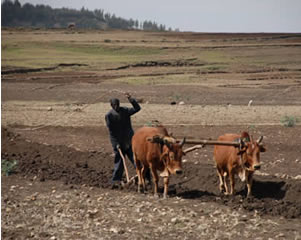« The Bureaucratic Run Around | Main | Ethiopia's Glorious Past - the Churches at Lalibela »
May 3, 2007
The Ethiopian Highlands
Click on image to play video (high speed connection advised).LOCATION: Debre Tabor, North Ethiopia
SEE WHERE WE ARE!
Longitude: N:11deg.51'36.
Latitude: E: 037deg.59'54.
Kms from Djibouti: 1,248
Not being a good twiddler of thumbs I decided last Sunday to resume progress from Dessie to Gonder, even if it meant spending a few days on a bus to backtrack for the visa. There's always the chance that the visa won't be approved even by the time I reach Gonder! So it made sense to push on regardless of the whims of Sudanese bureaucracy.
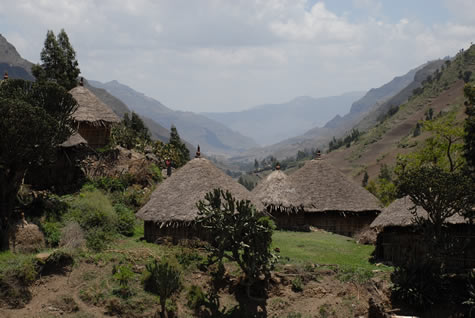
I'm now about half way to Gonder taking a rest day in the small town of Debre Tabor, once an important Ethiopian capital in the 18th and 19th centuries, now little more than a transport hub between regional towns. The roads since Dessie, although exceptionally rough, have afforded me a pretty good glimpse of the legendary Ethiopian Highlands. Having read up on the wonderful history of the region, epitomized perhaps by the the powerful Aksum Kingdom that rose in the 1st century AD to control a vast area stretching east across the Red Sea into large parts of Southern Arabia and west into the Sudanese Nile Valley, my expectations were high. However I am sorry to say that I am so far quite disappointed, both in the environment and the people.
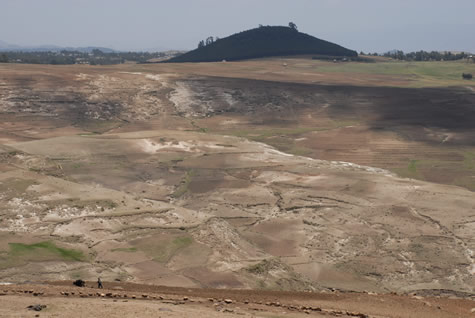
The land looks completely exhausted: all the trees have been cut down (they used to cover 40% of the landscape, now just 3%); any communal land is severely overgrazed and every square inch of soil, even on the sheer hillsides, has been ploughed for growing cereal crops including the indigenous 'tef' that the people use to make the bitter-tasting 'injera' bread (looking rather like a dirty nappy). The result is massive soil loss through erosion to the point where only rocks seem to thrive. Last night I had dinner with 'Dr. Richard', a German Agronomist/land management specialist working through German government funding to implement erosion control measures in the region. I got the distinct impression after we polished off several beers and a bottle of decent tasting Italian wine (he's the only westerner working here, so I think he was glad of the company) that he felt the program's efforts were fatally flawed for a number of reasons: the short timeframe that his superiors would expect results (a three or four year plan was not enough to see real progress, more like several decades of commitment), and more importantly the exponential birth rate (5%) leading to huge population pressure on the land and the extreme poverty of the local farmers leaving them no choice but to continue cutting the trees and tilling every inch of ground, even though they know it's not the right thing to do in the long run.
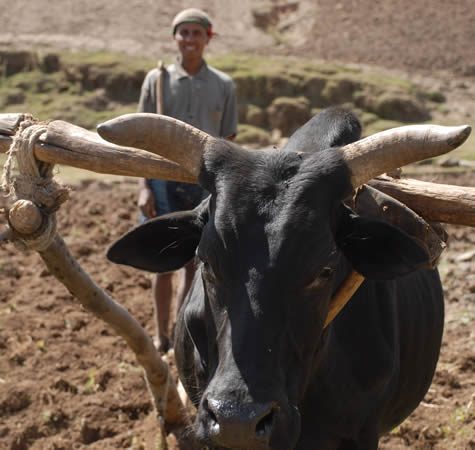
While most (but not all!) of the adults I've met are congenial and friendly, the children are for the most part completely vile, making the Tibetan stone throwers I encountered last year seem like angels. At the first sight of my bike they abandon their herds of sheep and goats grazing beside the road and run screaming and yelling to intercept me. If I'm on a flat stretch or going downhill I can get ahead of them before the stone-throwing starts. But if I'm going uphill I'm a sitting duck: they quickly catch up, bombarding me at first with the machine-gun staccato 'YouYouYouYouYou', which although is apparently meant to be a harmless way of getting one's attention, is usually delivered with such aggression and persistence that it quickly chews one's brains to bits. Then comes the begging: for money, pens (they have a bizarre obsession about acquiring pens here) or my Highland brand water bottles ('Highland-Highland-Give-Give-Give'). I experienced roadside begging in other countries of course, but nothing like this. When they see me coming with all my gear they must think it's Santa Claus riding over the horizon, pannier bags full of Christmas goodies that have to be dispersed as quickly as little hands will carry them away. And while I understand the underlying reason for this - decades of handouts by foreign NGO's and aid organizations (not to mention Sir Bob's 'Live Aid') to alleviate the war and famine that the country has traditionally suffered from - it's very sad to see the pride, self-reliance and dignity that I see in the faces of the older generations undermined so completely by the attitude of the young.
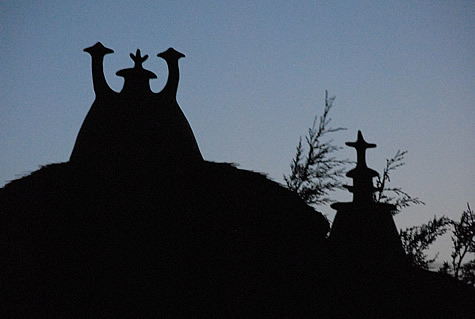
The usual result of such encounters, where I have to say no to almost every request, is stone-throwing. If I had a dollar for every stone that's been thrown at me over the past four days I'd have enough to fund another circumnavigation going the other way around! I hated having to do it but I've resorted to wearing the 'khukri' knife on my waist again, something I only do when traveling through areas where robbery is a possibility. While the road I'm on is definitely dangerous at night with 'shifta' (bandits) setting up roadblocks to rob travelers at gunpoint, the main reason for packing steel again is to frighten off the kids in daylight hours. It really is the only thing that seems to work. If I shout at them it only makes them more crazy. If I throw stones back it eggs them on even more, and if I were to hit any of them then I'd probably be thrown in a local jail and have some opportunistic local police try and extort a ludicrous sum of money from me as 'compensation' (none of which would ever reach the victim of course). But if I rest my hand on the handle of the Nepalese knife, which looks more menacing that it really is (in my hands at least), they flee with satisfying consistency.
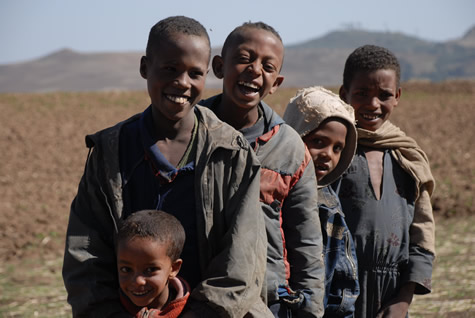
It's probably hard for you to reconcile these words with this photo of angelic looking children or the vlog. Bear in mind however they were being bribed for the photo with a packet of biscuits. Most Ethiopians HATE cameras and nine times out of ten refuse to be filmed either with a still camera or a video camcorder. Hence the rather short video clip for this update.
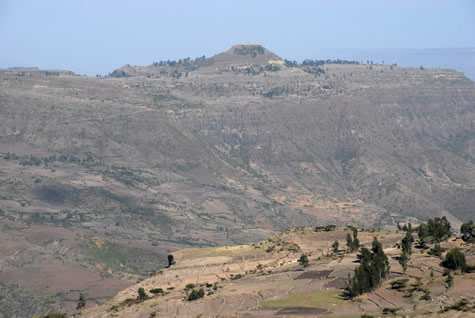
On a more positive note the first two days out from Dessie, in which I cut across country to take in the mountain top fortress of Maqedala where the Emperor Tewodros took his last stand against the British in 1867, allowed some spectacular scenery with few people problems. As I learnt from the harsh topography - the road descending and ascending over six vertical kilometres in just 100 horizontal kilometres - Tewodros had chosen his defensive position well. The Brits however, enraged by the imprisonment of several of their functionaries present at his court, brought a well equipped army of 32,000 from England and stormed the fortress. Unwilling to make terms Tewodros's army was wiped out and he himself committed suicide; a tragic end to a petty dispute that seriously weakened Ethiopia's image in the international community, especially with other colonial powers hungry for expansion.
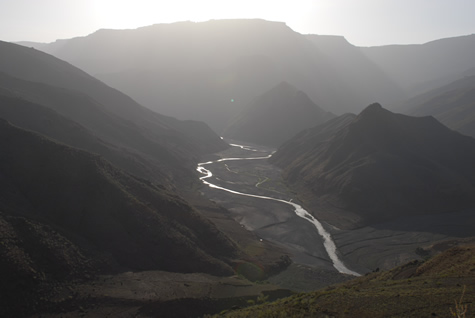
In a couple of days I'll be posting a follow-on update on one of the most important historic sites not only on the African continent, but in the Christian world: the rock-hewn churches of Lalibela.
jason
** MOKSHA SHIPPING TO EUROPE FUNDING DRIVE **
> Total to raise: $4,500
> Total raised to date: $2,400
> Total still to raise: $2,100
Sincerest thanks to the following for your pledges -
- Karl Kaseoru, US, $500
- John and Bridget Maxwell, UK, $50
- Jennifer Mackenzie, US, $50
- Ian McCormick, UK, $200
- Terry Mason, California USA, $200
- Jackie and Jean Bernard, Djibouti, $250.
- Erden Eruc and Nancy Board of Around n Over, Seattle USA, $250
- Sharon Kessler, Colorado USA, $500
- Jane Koca, San Jose USA, $50
- John Caldwell, San Jose USA, $100
- Greg Kolodziejzyk of Pedal the Ocean, Canada, $250

Posted on May 3, 2007 12:42 PM
